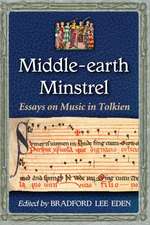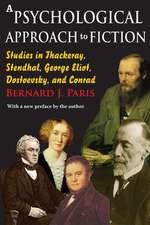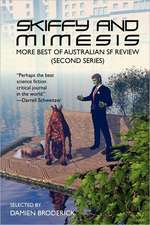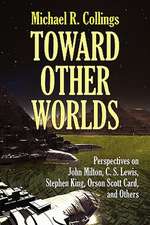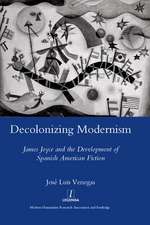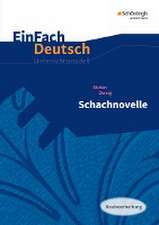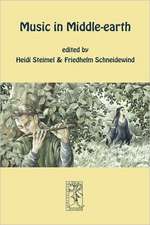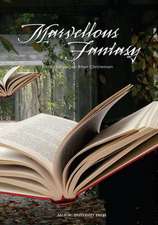Stefan and Lotte Zweig's South American Letters: New York, Argentina and Brazil, 1940-42
Editat de Professor Darién J. Davis Autor Stefan Zweig Editat de Professor Oliver Marshall Autor Lotte Zweigen Limba Engleză Paperback – 17 noi 2010
| Toate formatele și edițiile | Preț | Express |
|---|---|---|
| Paperback (1) | 190.06 lei 6-8 săpt. | |
| Bloomsbury Publishing – 17 noi 2010 | 190.06 lei 6-8 săpt. | |
| Hardback (1) | 567.17 lei 6-8 săpt. | |
| Bloomsbury Publishing – 17 noi 2010 | 567.17 lei 6-8 săpt. |
Preț: 190.06 lei
Preț vechi: 221.35 lei
-14% Nou
Puncte Express: 285
Preț estimativ în valută:
36.38€ • 39.53$ • 30.58£
36.38€ • 39.53$ • 30.58£
Carte tipărită la comandă
Livrare economică 21 aprilie-05 mai
Preluare comenzi: 021 569.72.76
Specificații
ISBN-13: 9781441107121
ISBN-10: 1441107126
Pagini: 224
Dimensiuni: 138 x 216 x 15 mm
Greutate: 0.27 kg
Editura: Bloomsbury Publishing
Colecția Continuum
Locul publicării:New York, United States
ISBN-10: 1441107126
Pagini: 224
Dimensiuni: 138 x 216 x 15 mm
Greutate: 0.27 kg
Editura: Bloomsbury Publishing
Colecția Continuum
Locul publicării:New York, United States
Caracteristici
First hand accounts of the despair that lead to the Zweigs' suicides.
Cuprins
Introduction
Part I: Letters from Argentina and Brazil, 1940-41
Part II: New York Interlude, 1941
Part III: Letters from Brazil, 1941-42
Part IV: Postscript: Letter from Ernst Feder, Petrópolis, 1942
Dramatis Personae
Part I: Letters from Argentina and Brazil, 1940-41
Part II: New York Interlude, 1941
Part III: Letters from Brazil, 1941-42
Part IV: Postscript: Letter from Ernst Feder, Petrópolis, 1942
Dramatis Personae
Recenzii
"Davis and Marshall have filled a gap in Latin American literary history by presenting us with a picture of the last years of the famed author, cast adrift by the rise of Nazism and enforced exile. The letters of Stefan and Lotte Zweig cast a flickering light on the psyches of many Austrian and German Jews who, rejected by their homelands, were incapable of either adapting to a new home or of drawing sustenance from their Jewish origins. Aloof from the satisfactions of popular acclaim and paralyzed by guilt over their comfortable life in Brazil, the Zweigs broke through their emotional isolation with an act that sealed their unique place in literary history. Davis and Marshall create a coherent narrative from the episodic correspondence and bring the role of Lotte into view. But the Zweigs' brief sojourn in South America confirms the European boundaries to Stefan's oevre and his marginalization from Argentine, Brazilian, and Jewish history." -- Judith Laikin Elkin, Latin American Jewish Studies Association
"These letters help to prove that definitive biographies do not exist." -- Alberto Dines, author of Morte no Paraíso - A Tragedia de Stefan Zweig (1981, 2004; Portuguese) and Tod im Paradies Die Tragödie des Stefan Zweig (2006; German).
"These intimate, familial and war-haunted letters from Stefan and Lotte Zweig throw a new light on their South American years, and their last, tragic act. The informative and insightful introductory texts provided by Oliver Marshall and Darién J. Davis additionally illuminate the complex feelings both Zweigs had about their exile-a condition which they chose, but did not survive. A worthwhile addition to the annals of literary history during the darkest of Europe's periods." -- Eva Hoffman, author of Lost in Translation: A Life in a New Language (Penguin) and After Such Knowledge (PublicAffairs).
"Based on hitherto unknown personal correspondence of Stefan and Lotte Zweig, this thought-provoking and magisterial work of literary-historical scholarship offers a rare blending of clarity, psychological insight, and meticulous research. Refreshing, vastly informative, and stunning in its revelations, this exemplary biographical account is an indispensable standard for many fields." Prof. Jeffrey B. Berlin, co-editor of Stefan Zweig - Friderike Zweig: Briefwechsel 1912-1942 (2006); Stefan Zweig: Briefe 1897-1942. 4 vols. (1995-2005); Stefan Zweig: Briefwechsel mit Bahr, Freud, Rilke und Schnitzler (1987), all published by S. Fischer Verlag, Frankfurt a/M.
"Biographical research has already given us quite a good deal of insight into Stefan Zweig`s and his second wife Lotte`s course of life, about their years in exile, about their voluntary death in February 1942 in Brazil. And yet there is still a lot that we do not know. Stefan and Lotte Zweig`s letters from their last two years, now published in a selection for the first time, give us a clear view of their living conditions. Never before has this been made possible in such immediacy. Now we can read these intimate letters which allow us to witness both of them at such close range and with a familiarity as has never been achieved before. These letters are as much a fascinating record of domestic felicity as they are a document of a world-historical tragedy. Finally, and for the very first time, Lotte Zweig is given a distinct voice of her own. And what we have surmised for so long turns out not to be true: the image of the shy and sickly wife, always resigned and submissive to her husband, is completely wrong. This is a thoroughly engaging and really touching book. One will not put these letters aside before having read them all through. It will be of utmost importance for future biographical research about the Austrian writer Stefan Zweig and his wife Lotte." -- Klemens Renoldner, Director of Stefan Zweig Centre, University Salzburg, Austria
These moving letters reveal the fragility of a sensitive couple tragically caught between an imposing past and an uncertain future.
... provides a personal account of the Zweig's everyday life during their last years... should be warmly welcomed since it is accessible to the reading public and will prove useful to Zweig scholars.
Stefan and Lotte Zweig's South American Letters is a timely and relevant publication and a good addition to the body of correspondence already published about Stefan Zweig... This collection of letters serves as a powerful reminder that the experience of exile posed a daunting challenge to many people, not all of whom were able to carry on with their lives and face the uncertainty and perils of their situation.
"This is a rich, rewarding, and exciting contribution to our understanding of the final years in the life of Stefan and Lotte Zweig based on letters they wrote and received in their South American refuge from Nazism. It is also the first collection to bring to light Lotte's long-neglected epistolary voice and the central role that she played during this South American period in helping to bring to light some of her husband's greatest and most significant literary and autobiographical works." -- Leo Spitzer, author of Hotel Bolivia: The Culture of Memory in a Refuge from Nazism, Lives in Between: Assimilation and Marginality in Austria, Brazil, West Africa, and most recently, Ghosts of Home: The Afterlife of Czernowitz in Jewish Memory.
"Stefan Zweig's second wife, the much younger Lotte Altmann, has been a shadowy figure until now- a dutiful secretary to the great writer, but not much more. In this valuable collection of the letters they wrote from South America in the last two years of their tragically curtailed lives, she emerges as a woman of real human warmth and spirit. Future biographers will find this book essential to their understanding of a man driven to depression by the fact that lofty ideals of universal peace cannot be sustained in the face of a tyranny such as Nazism."-- Paul Bailey, author of Uncle Rudolf: A Novel (Fourth Estate, 2002), and recipient of the E.M. Forster Award from the American Academic of Arts and Letters
"Among the many merits of this compelling, carefully edited volume is the insight it provides into a problem confronting all refugees from Nazidominated Europe: How might one begin conceiving a new vision of home while 'the old country' went up in flames? They also tell the melancholy story of how, barely a year after the euphoric Bahia letter, Stefan and Lotte committed suicide in Petropolis, above Rio."-- Jewish Review of Books
"Davis and Marshall offer a rare glimpse into the lives of the prolific author Stefan Zweig and his second wife, Lotte, through a collection of personal letters. [...] The editors present the vital historical knowledge of not only the infamous couple, but also the growing political turmoil that would escalate into WWII, illuminated in part by the organization of the correspondence here. Though written mostly to Lotte's brother and sister-in-law, the letters reveal a growing depression and a lack of contact with friends and family, illuminating both the general hopelessness common to that era and the importance of a sense of belonging." -- Publishers Weekly
"... provides a detailed epistolary account of the life and times of one of Europe's preeminent intellectuals. [...] Ultimately, Stefan and Lotte Zweig's South American Letters reads as a cruel story of dislocation and despair: from their arrival in Rio de Janeiro to their dual-suicide in Petrópolis two years later, the Zweigs were unable to relinquish themselves of the knowledge that the people of Europe-once 'pleasant and cultured'-were engaged in an endless conflict for racial and territorial supremacy. Through it all, however, the Zweigs continued to write, approaching their correspondence as a form of therapy-one which allowed them, rather like the tortured characters of W. G. Sebald or Joseph Roth, to come to terms with what Stefan referred to in 1942 as the 'incertainty and isolation' of war. Their pact complete, the Zweigs succumbed to their desolation-and to the desolation of a generation robbed of its homeland."-- Rain Taxi
They give us the best insight we have yet had into the last years of this remarkable writer and of the wife who was more important than many have hitherto allowed.
.well-edited and annotated . These frank, revealing and moving letters to family members left behind in Europe, concluding with the farewell ones written shortly before the suicides, are windows into the minds and hearts of these exiles. The Zweigs' depression is manifest, and this persistent state, along with Lotte's health problems and Stefan's awareness of old age awaiting him, goes a long way to elucidating what to so many, both then and now, was an inexplicable act.
"These letters help to prove that definitive biographies do not exist." -- Alberto Dines, author of Morte no Paraíso - A Tragedia de Stefan Zweig (1981, 2004; Portuguese) and Tod im Paradies Die Tragödie des Stefan Zweig (2006; German).
"These intimate, familial and war-haunted letters from Stefan and Lotte Zweig throw a new light on their South American years, and their last, tragic act. The informative and insightful introductory texts provided by Oliver Marshall and Darién J. Davis additionally illuminate the complex feelings both Zweigs had about their exile-a condition which they chose, but did not survive. A worthwhile addition to the annals of literary history during the darkest of Europe's periods." -- Eva Hoffman, author of Lost in Translation: A Life in a New Language (Penguin) and After Such Knowledge (PublicAffairs).
"Based on hitherto unknown personal correspondence of Stefan and Lotte Zweig, this thought-provoking and magisterial work of literary-historical scholarship offers a rare blending of clarity, psychological insight, and meticulous research. Refreshing, vastly informative, and stunning in its revelations, this exemplary biographical account is an indispensable standard for many fields." Prof. Jeffrey B. Berlin, co-editor of Stefan Zweig - Friderike Zweig: Briefwechsel 1912-1942 (2006); Stefan Zweig: Briefe 1897-1942. 4 vols. (1995-2005); Stefan Zweig: Briefwechsel mit Bahr, Freud, Rilke und Schnitzler (1987), all published by S. Fischer Verlag, Frankfurt a/M.
"Biographical research has already given us quite a good deal of insight into Stefan Zweig`s and his second wife Lotte`s course of life, about their years in exile, about their voluntary death in February 1942 in Brazil. And yet there is still a lot that we do not know. Stefan and Lotte Zweig`s letters from their last two years, now published in a selection for the first time, give us a clear view of their living conditions. Never before has this been made possible in such immediacy. Now we can read these intimate letters which allow us to witness both of them at such close range and with a familiarity as has never been achieved before. These letters are as much a fascinating record of domestic felicity as they are a document of a world-historical tragedy. Finally, and for the very first time, Lotte Zweig is given a distinct voice of her own. And what we have surmised for so long turns out not to be true: the image of the shy and sickly wife, always resigned and submissive to her husband, is completely wrong. This is a thoroughly engaging and really touching book. One will not put these letters aside before having read them all through. It will be of utmost importance for future biographical research about the Austrian writer Stefan Zweig and his wife Lotte." -- Klemens Renoldner, Director of Stefan Zweig Centre, University Salzburg, Austria
These moving letters reveal the fragility of a sensitive couple tragically caught between an imposing past and an uncertain future.
... provides a personal account of the Zweig's everyday life during their last years... should be warmly welcomed since it is accessible to the reading public and will prove useful to Zweig scholars.
Stefan and Lotte Zweig's South American Letters is a timely and relevant publication and a good addition to the body of correspondence already published about Stefan Zweig... This collection of letters serves as a powerful reminder that the experience of exile posed a daunting challenge to many people, not all of whom were able to carry on with their lives and face the uncertainty and perils of their situation.
"This is a rich, rewarding, and exciting contribution to our understanding of the final years in the life of Stefan and Lotte Zweig based on letters they wrote and received in their South American refuge from Nazism. It is also the first collection to bring to light Lotte's long-neglected epistolary voice and the central role that she played during this South American period in helping to bring to light some of her husband's greatest and most significant literary and autobiographical works." -- Leo Spitzer, author of Hotel Bolivia: The Culture of Memory in a Refuge from Nazism, Lives in Between: Assimilation and Marginality in Austria, Brazil, West Africa, and most recently, Ghosts of Home: The Afterlife of Czernowitz in Jewish Memory.
"Stefan Zweig's second wife, the much younger Lotte Altmann, has been a shadowy figure until now- a dutiful secretary to the great writer, but not much more. In this valuable collection of the letters they wrote from South America in the last two years of their tragically curtailed lives, she emerges as a woman of real human warmth and spirit. Future biographers will find this book essential to their understanding of a man driven to depression by the fact that lofty ideals of universal peace cannot be sustained in the face of a tyranny such as Nazism."-- Paul Bailey, author of Uncle Rudolf: A Novel (Fourth Estate, 2002), and recipient of the E.M. Forster Award from the American Academic of Arts and Letters
"Among the many merits of this compelling, carefully edited volume is the insight it provides into a problem confronting all refugees from Nazidominated Europe: How might one begin conceiving a new vision of home while 'the old country' went up in flames? They also tell the melancholy story of how, barely a year after the euphoric Bahia letter, Stefan and Lotte committed suicide in Petropolis, above Rio."-- Jewish Review of Books
"Davis and Marshall offer a rare glimpse into the lives of the prolific author Stefan Zweig and his second wife, Lotte, through a collection of personal letters. [...] The editors present the vital historical knowledge of not only the infamous couple, but also the growing political turmoil that would escalate into WWII, illuminated in part by the organization of the correspondence here. Though written mostly to Lotte's brother and sister-in-law, the letters reveal a growing depression and a lack of contact with friends and family, illuminating both the general hopelessness common to that era and the importance of a sense of belonging." -- Publishers Weekly
"... provides a detailed epistolary account of the life and times of one of Europe's preeminent intellectuals. [...] Ultimately, Stefan and Lotte Zweig's South American Letters reads as a cruel story of dislocation and despair: from their arrival in Rio de Janeiro to their dual-suicide in Petrópolis two years later, the Zweigs were unable to relinquish themselves of the knowledge that the people of Europe-once 'pleasant and cultured'-were engaged in an endless conflict for racial and territorial supremacy. Through it all, however, the Zweigs continued to write, approaching their correspondence as a form of therapy-one which allowed them, rather like the tortured characters of W. G. Sebald or Joseph Roth, to come to terms with what Stefan referred to in 1942 as the 'incertainty and isolation' of war. Their pact complete, the Zweigs succumbed to their desolation-and to the desolation of a generation robbed of its homeland."-- Rain Taxi
They give us the best insight we have yet had into the last years of this remarkable writer and of the wife who was more important than many have hitherto allowed.
.well-edited and annotated . These frank, revealing and moving letters to family members left behind in Europe, concluding with the farewell ones written shortly before the suicides, are windows into the minds and hearts of these exiles. The Zweigs' depression is manifest, and this persistent state, along with Lotte's health problems and Stefan's awareness of old age awaiting him, goes a long way to elucidating what to so many, both then and now, was an inexplicable act.





